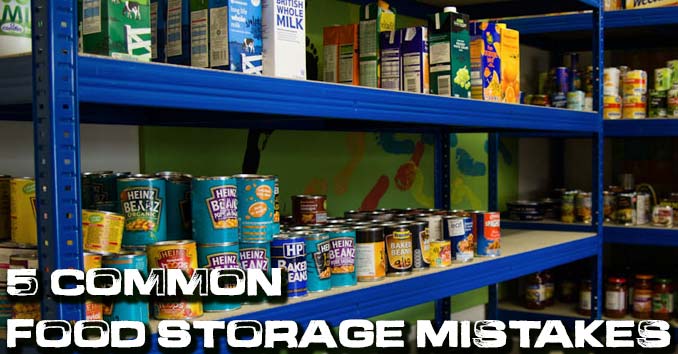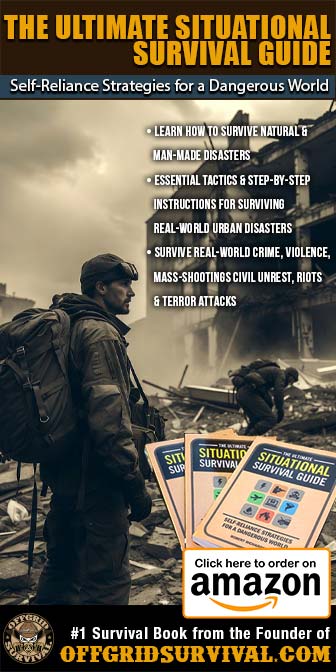If you are just getting started with storing food, there are a couple of common mistakes that most beginners make.

Stocking up on foods that you don’t regularly eat.
While stockpiling pizza might be your idea of the ultimate food storage strategy, it might not be the most practical idea. That being said, you do need to stock up on foods that you eat on a regular basis.
A survival situation is not a good time to try something for the first time; doing so could wreak havoc on your stomach, and cause problems that make your situation only that much worse. Make sure you stock up on things that you really want to eat, and foods that have a lot of flavors.
Storing all your food in the same place.
A common mistake that I see a lot of new preppers make is designating one area of their home as their preparedness storage area.
If you only have one place, then, by all means, use that place. But if you have the room, it’s always a good idea to have multiple food storage locations. That way if a disaster like a flood or an earthquake damages your supplies, you’ll have a backup supply that hopefully wasn’t touched by the disaster.
Not using your stored food.
This is a big one. A lot of beginners have a but it, and then forget about it approach to food storage. They stock up on huge stockpiles of food and then let it sit in some basement closet until it starts to stink.
Don’t forget to rotate your food; storing food that you don’t eat is, in my opinion, a huge waste of money. Every time you go to the store, put the new food you buy at the very back of your supplies; and eat the stored food first.
- Check out the Harvest Food Rotation System by Shelf Reliance
for easy rotation of food stocks.
Make sure you know how to use it.
This may sound odd, but it’s pretty shocking how many preppers have no idea what to do with their emergency food stocks.
I talk to people all the time who tell me about their about their buckets full of beans, wheat, grains, and you name it; these same people have never cooked a homemade meal in their life. Having buckets full of grain is great if you know how to use it, but if you’ve never baked a loaf of bread, what good are all those buckets?
Resources for learning how to cook:
- Top tips for those who want to learn to cook from scratch
- Cooking with Basic Ingredients: War Time Recipes
- 56 Long-Term Survival Foods and Essential Supplies
Don’t forget to stock up on sweets and comfort foods.
During a survival or SHTF situation, junk food can be a huge morale booster. While it’s not the best thing for your body, it can help to calm your nerves and clear your mind. The physiological boost of having foods that you like is more important that you realize, especially during a stressful survival situation.






Can u please share with us how to have a pantry
full of food for a year…how to prepare fir it..
Self reliance .. What to store up
Start slow and small, accumulate stored food over time as to not overwhelm your storage space or your wallet. Stick to familiar foods that you would normally eat on a regular basis. Date all foods and practice the FIFO method(first in first out) so you can maximize shelf life and prevent spoilage. Certain foods last longer than others so search for products that have a long shelf life such as dehydrated products and dried legumes and grains.
I have flour and wheat stored, along with sugar and yeast. I figure I can bake bread and rolls (printed up a few good recipes. – dont forget the grid may be down- you wont have the internet to find out what to do with your wheat after the fact). I have some meat and fruit in the freezer-along with some jerky making seasonings in case I need to preserve the meat. I also have canned vegetables and seeds for growing fresh vegetables. and canned and dried beans. and about 100 # of rice. we rely on a well but I do have a large swimming pool full of water. I just feel like I am forgetting something……
Don’t wait too long to begin. From what I’ve heard, a “run” has started on freeze dried foods so that it is not as easy to get as before. Suggestion: read the book ONE SECOND AFTER for a look at how to cope without, not only the grid being down, but all forms of communication and transportation. It will give the reader ideas of what to stock up on and what to expect in a total blackout situation. Though fiction, it is written by a history professor who bases everything in the book on events in history that actually occurred.
Thanks for the post. I have a question I’m hoping you can help with. I mostly eat fresh veggies and meat. I avoid processed foods and don’t really eat much in the way of grains – basically a Primal / Paleo diet. (see http://www.marksdailyapple.com/ for more info). How can I prep for long term food storage without stockpiling a ton of wheat, rice, and corn? In other words, I’m looking for suggestions on how to do tip #1 Stockpile what you eat.
Thanks!
Drunk on Pork: suggestions. Check the website Beprepared.com (there are others, but I use this one) for what they have to offer in the way of dehydrated and freeze foods or ways to dehydrate whatever you like to eat. Another idea would be to keep a supply of non hybrid seeds as a hedge against the future. They store for about 4 yrs. Granted it will take a season to grow what you need, but once a harvest comes in there will be fresh vegetables to eat and dehydrate. Another suggestion, obtain and keep a copy of the SAS Survival Manual if things really get rough and a person has to “rough it.” Final suggestion: keep a supply of survival bars like SOS (survival at sea) bars on hand. They keep for 4 yrs ,if not exposed to high temperatures. They come in 400, 1200, 2400 calorie bars. In a disaster situation, they can supply enough daily requirements to get by. They are compact, so easy to store, and fairly reasonable in price. Hope this helps
To Pam on April 5, yes, you are forgetting something! You said you have wheat – how will you grind it? How will you bake it? Your stuff in the freezer will go bad. “The grid will be down”. Also, the swimming pool full of water might be used for washing, but it has too many chemicals to drink…what will you do about water? You may need a hand pump for your well, or find a way to store water. Even a downspout connected to a barrel to collect rainwater would be ok – as long as it was filtered and purified.
Dried fruit well stored will last for up to a year or so. always eep a rolling inventory of what you got and look out for those bargain tinned goods that will last for years.
With all the natural disasters around the world, making sure your family is prepared is top priority. Adding freeze dried food storage makes being prepared easy!
it takes time to prepare food for storage.
it costs more money for freeze dried food.
it is wasteful to eat food with a 20 year shelf life.
come hard times, you will eat the foods you have whether you eat them regularly now or not.
if your food storage is just store bought food, then do rotate it.
time to start learning old ways of doing things. Sewing, baking bread (and knowing how to alter recipies and have it still come out like bread instead of bricks), all kinds of food preperations (canning, dehydrating, freezing, ect), preparing your own deer or other wild game (or how to raise your own).
My point is that there is alot to learn about and alot to do and prepare for, it might be a good start to just read and learn.
See a FB page called Food Storage Made Easy. Or visit their website Foodstoragemadeeasy.com (Ithink). These women are complete pros at food storage. They make it seem easy!
If you’re storeing dry goods (like flour, rice, powdered milk, etc.) mixing a few bay leaves in with what you store prevents the food from getting bugs!
go buy a walmart that should cover about all of it….
I have long stored foods and equipment and the new product for food we discovered is so superior that we DO eat it all the time, rotate. we do store in several locations because we don’t want to lose it all if raided by..whomever.. I have taught survival for many years. I have recently been contacted more and more often to teach basics and to discuss more advanced.